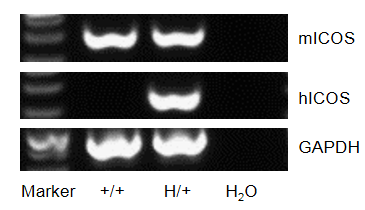B-hICOS mice
| Strain Name | C57BL/6-Icostm7(ICOS)Bcgen/Bcgen | Common Name | B-hICOS mice |
| Background | C57BL/6 | Catalog number | 112105 |
|
Aliases |
ICOS, AILIM, CD278, CVID1, inducible T cell costimulator | ||

Strain specific analysis of ICOS gene expression in wild type (WT) mice and B-hICOS mice by RT-PCR. Mouse Icos mRNA was detectable in thymus of WT mice (+/+) and heterozygous B-hICOS mice (H/+). Human ICOS mRNA was detectable only in heterozygous B-hICOS mice (H/+) but not in WT mice (+/+). The positive band was confirmed to be correct by sequencing.

Strain specific ICOS expression analysis in homozygous B-hICOS mice by flow cytometry. Splenocytes were collected from wild type (WT) mice (+/+) and homozygous B-hICOS mice (H/H) stimulated with anti-CD3ε in vivo and analyzed by flow cytometry with vopratelimab (in house), STIM-003 (in house) and GSK-3359609 (in house). ICOS was detectable in WT mice (+/+) and homozygous B-hICOS mice (H/H) due to the cross-reactivity of antibodies. Human ICOS was exclusively detectable in homozygous B-hICOS mice (H/H) but not in WT mice (+/+).

Mouse spleen CD4/CD8 ICOS expression and proliferation by flow cytometry. Splenocytes from wild type (WT) mice (+/+), heterozygous B-hICOS mice (H/+) and homozygous B-hICOS mice (H/H) were stained by CellTrace Violet staining solution, and incubated for 72h in the presence of anti-mCD3ε, or anti-mCD3ε and anti-mCD28, or anti-mCD3ε and human ICOSL recombinant protein. The expression and proliferation of CD4+ T cells and CD8+ T cells were measured by flow cytometry. Mouse ICOS was detectable in WT mice (+/+) and heterozygous B-hICOS mice (H/+). Human ICOS was exclusively detectable in heterozygous B-hICOS mice (H/+) and homozygous B-hICOS mice (H/H) but not in WT mice (+/+). The data was obtained from a partner.

Mouse spleen CD4/CD8 ICOS expression and proliferation by flow cytometry. Splenocytes from wild type (WT) mice (+/+), heterozygous B-hICOS mice (H/+) and homozygous B-hICOS mice (H/H) were stained by CellTrace Violet staining solution, and incubated for 72h in the presence of anti-mCD3ε, or anti-mCD3ε and anti-mCD28, or anti-mCD3ε and human ICOSL recombinant protein. The expression and proliferation of CD4+ T cells and CD8+ T cells were measured by flow cytometry. Mouse ICOS was detectable in WT mice (+/+) and heterozygous B-hICOS mice (H/+). Human ICOS was exclusively detectable in heterozygous B-hICOS mice (H/+) and homozygous B-hICOS mice (H/H) but not in WT mice (+/+). The data was obtained from a partner.

Mouse spleen CD4/CD8 ICOS expression and proliferation by flow cytometry. Splenocytes from wild type (WT) mice (+/+), heterozygous B-hICOS mice (H/+) and homozygous B-hICOS mice (H/H) were stained by CellTrace Violet staining solution, and incubated for 72h in the presence of anti-mCD3ε, or anti-mCD3ε and anti-mCD28, or anti-mCD3ε and human ICOSL recombinant protein. The expression and proliferation of CD4+ T cells and CD8+ T cells were measured by flow cytometry. The CD4+ T cells and CD8+ T cells activation in heterozygous B-hICOS mice (H/+) and homozygous B-hICOS mice (H/H) was upregulated by anti-mCD3ε and human ICOSL recombinant protein, similar to the activation by anti-mCD3ε and anti-mCD28. This demonstrates that introduction of human ICOS in place of its mouse counterpart does not affect T cell activation. The data was obtained from a partner.

ICOS delivers a co-stimulatory signal that is essential both for efficient interaction between T and B cells and for normal antibody responses to T-cell-dependent antigens. Mice homozygous for disruptions in the ICOS gene show reduced basal IgG1 levels and impaired interactions between T and B cells. Immunoglobulin class switching, including production of allergy-mediating IgE, is defective. To determine the physiological function of ICOS/ICOSL, we determined the basal serum levels of IgG1 in wild type (WT) mice and homozygous B-hICOS mice (8-week-old, n=5). The basal serum levels of IgG1 in B-hICOS mice were significantly higher than those in WT mice (A), which may be caused by the humanization of ICOS. We further analyzed serum from WT mice and homozygous B-hICOS mice challenged with T-cell-dependent antigen ovalbumin (OVA), and the presence of OVA-specific IgG1 and IgE was determined by ELISA. The OVA-specific IgG1 (B) and IgE (C) in challenged B-hICOS mice were similar to those in challenged WT mice. The data indicate that the ICOS/ICOSL pathway is functional in B-hICOS mice.







